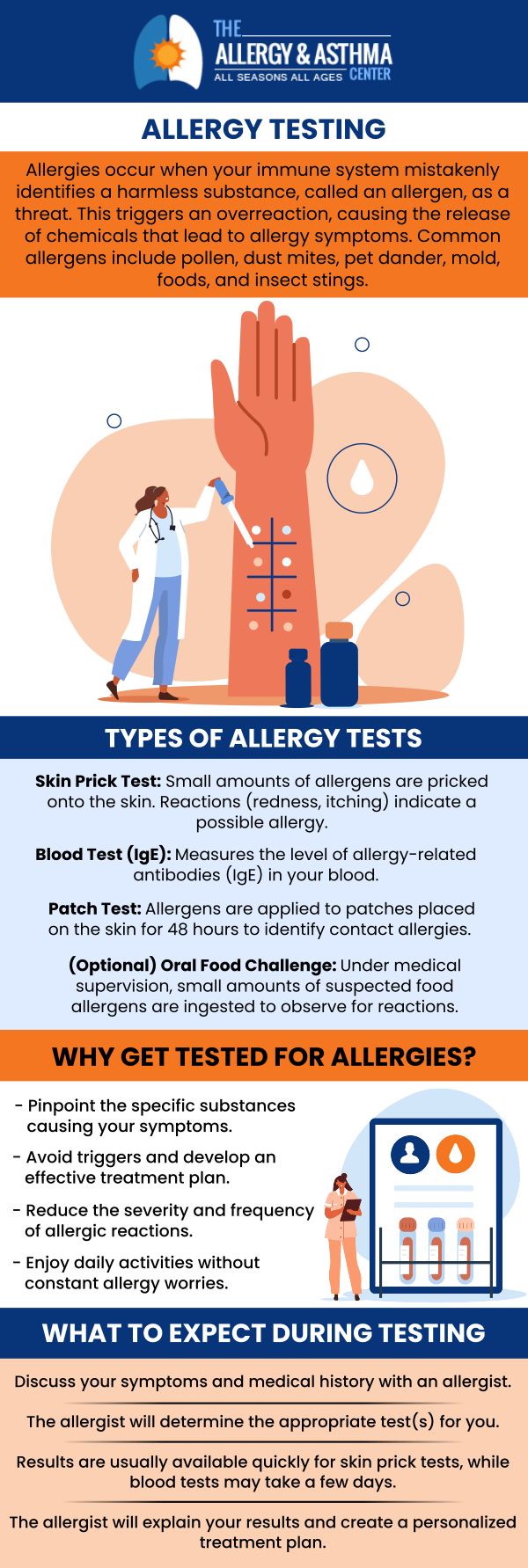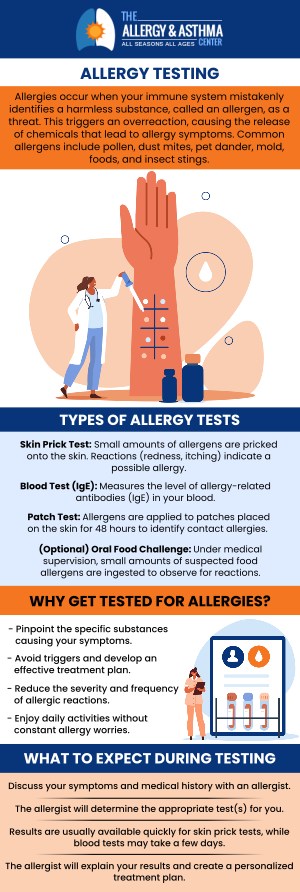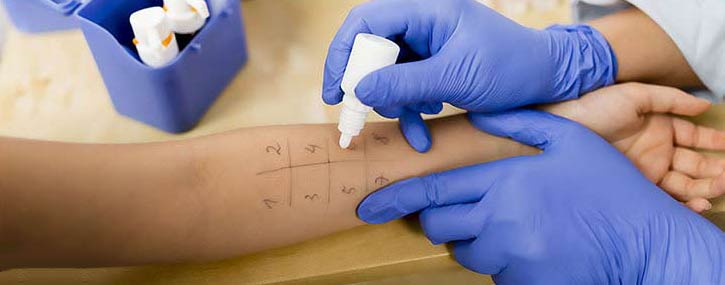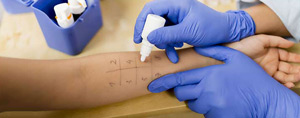Allergy Testing Services
At the Allergy & Asthma Center, our board-certified doctors and medical staff provide comprehensive allergy treatments and testing. For more information, please contact us or book an appointment online. We serve patients from Lawrenceville GA, Atlanta GA, Conyers GA, Suwanee GA, Duluth GA, Grayson GA, Decatur GA, Brookhaven GA, Lithonia GA and Covington GA.




If you suffer from allergies, our expert allergy doctors provide the allergy relief you need. To help you manage your or your child’s allergy symptoms most effectively, our board-certified allergists can determine what is causing your allergy. Once the specific allergen(s) causing symptoms have been identified through allergy testing, we can develop a treatment plan aimed at controlling or eliminating your allergy symptoms.
Allergy testing can be performed on the skin or through the blood, but most allergists prefer skin testing because the patient can be tested to large numbers of allergens at one visit and the results are available immediately. Please read a quick overview of allergy tests available at our allergy clinic.
Skin Testing
Prick Testing
Allergists usually begin with prick (also called percutaneous) testing. Using a plastic “pick”, or a device called a multitest, the surface of the skin is lightly pricked and the allergen, previously placed on the tip of the device, is introduced into the skin. After this simple application of the allergen(s), one waits 15-20 minutes in order to see if there is a skin reaction in the form of a wheal (swelling) or a flare (redness). The size of the reaction is then measured to determine the degree of allergy. The larger the skin reaction, the stronger the allergy.
This test is usually performed on the back, but it may be performed on the forearm. This test may include one or more relevant allergens, or a standard panel of the most common allergens including trees, grasses, weeds, and molds, dust mites, and pet hair. Foods are also tested by this method. Most patients tolerate percutaneous testing extremely well. There is no pain involved but young children sometimes report minor discomfort. The most common complaint is itching from wheals that can develop over 15 to 20 minutes. These wheals and itching usually resolve over thirty minutes.
Intradermal Testing
Intradermal tests are usually performed if the patient does not demonstrate significant reactivity on prick testing of suspected allergens. This test introduces a stronger concentration of allergen under the skin, and will often diagnose allergies that the percutaneous test did not reveal. Intradermal testing involves injecting, with a very tiny needle, a small amount of allergen under the skin of the arm. These tests are mildly uncomfortable and are commonly described as momentarily stinging like an ant bite. Because of this, only a handful of tests are usually performed by this method. Like prick testing, results are determined by measuring the size of the wheals which develop over 10-15 minutes. Intradermal testing is generally used for the diagnosis of inhalant, venom, or drug allergies, but is not used for testing to foods.
Blood Testing
Sometimes your allergist may do a blood test, called a RAST (radioallergosorbent) test or ImmunoCAP test. These blood tests are accurate predictors of allergy, but they have some disadvantages to skin testing: 1) the test involves drawing blood 2) it generally costs more than skin testing if large numbers of allergens are being tested, and 3) the results are not immediately available.
Allergy tests through the blood are generally used in cases in which skin tests cannot be performed, such as with very young children, in patients taking certain medications which may interfere with the results, or those with skin conditions that may interfere with skin testing.
Other Allergy Testing Techniques
Challenge testing: Challenge testing involves introducing small amounts of the suspected allergen by the oral, inhaled or other routes. Challenges are safe as long as they are done by experienced medical staff and closely supervised by an allergist.
Elimination/Challenge tests: This method is utilized most often with foods or medicines. The patient is instructed to modify his/her diet to totally avoid the suspected allergen for a period of time. If the patient sees significant improvement while avoiding the suspected allergen (food or medicine), he/she is then sometimes “challenged” by reintroducing the allergen in order to see if the symptoms can be reproduced.
Patch testing: This form of testing is indicated to help ascertain the cause of skin contact allergy, or contact dermatitis. Patches, treated with usually a number of different chemicals or skin sensitizers to which people are most commonly allergic, are applied to the back. The skin is then examined for possible local reactions at least twice, usually at 24 hours after application of the patch, and again at 48 or 72 hours.
The Allergy & Asthma Center offers the best allergy testing services in Atlanta Metropolitan Area. Our board-certified allergists are ready to help you manage your asthma & allergy symptoms. Please contact us today to request an appointment at our allergy clinic in Atlanta. We have 3 convenient locations near you!

Additional Allergy & Asthma Services
▸ Allergy Shots
▸ Allergy Testing
▸ Asthma
▸ Bronchodilators
▸ Drug Allergy
▸ Food Allergy
▸ Insect Allergy
▸ Nasal/Sinus Allergies
▸ Pediatric Allergy
▸ Pediatric Asthma
▸ Skin Allergy
▸ Spring Allergies




